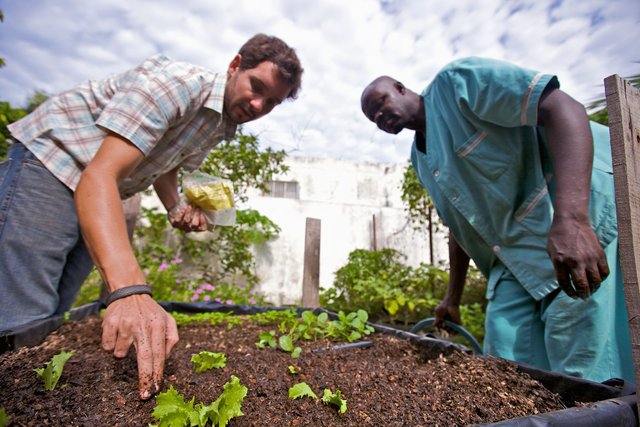
(above) In this November 2009 file photo, a Peace Corps volunteer helps a Senegalese man garden.
Safety at risk for Peace Corps volunteers
June 17, 2010 - Washington Times
Audit finds lax security measures
By Jeffrey Anderson
More than 30 Peace Corps volunteers were raped or sexually assaulted last year while hundreds of others were attacked, robbed, burglarized or threatened, bolstering criticism that the agency has failed to provide "a consistent and complete safety and security program."
In a little-noticed safety and security audit released in April, the Peace Corps' office of inspector general said volunteers were placed "at greater risk because the agency did not ensure that posts fully implemented required safety and security policies." It also said the Peace Corps' security program "lacked essential elements."
Investigative memos obtained by The Washington Times through an open records request detail some of the crimes that were the subject of the audit, showing a string of violence, theft and other illegal activities around the world in recent years involving Peace Corps volunteers as both perpetrators and victims.
The memos detailed 29 of the more than 40 cases that were closed last year by the inspector general's investigators. Of those 29 cases, 16 involved allegations of rape or sexual assault, two involved accidental death, one involved drug smuggling, two involved aggravated assaults, seven involved either robbery, theft or embezzlement, and one involved the misuse of government funds.
Perhaps the most alarming threat described in the audit and the memos is the one posed to women working in countries where cultural attitudes differ from Western values. More than a third of the inspector general's office investigations closed last year dealt with rape or sexual assault in countries such as Armenia, Georgia, Moldova and Mongolia.
In a 2007 case in Mongolia, a female volunteer opened her apartment door for a group of boys who forced alcohol on her and gang-raped her.
The investigative memo said the case also involved a robbery at knife point, but was complicated by the victim's acknowledgment that she once supplied her attackers with money to buy alcohol - a misdemeanor offense because the attackers were younger than 18.
Information released by the agency shows that even when a complaint triggers an investigation of a violent incident involving a Peace Corps employee or volunteer, referrals to the Justice Department for prosecution are extremely rare, with overseas court actions only slightly more frequent.
One case involved a woman who was raped in Bolivia in 2005 by a man she knew. According to the memos, the woman feared she would be arrested on false allegations and trumped-up charges in a corrupt legal system, so she declined to prosecute, dropped her complaint and left the country.
A 2008 rape in Tbilisi, Georgia, was dropped when the victim declined to testify out of fear for her safety, the memos said.
According to the memos, the rape of a volunteer in Armenia in June 2009 was allegedly committed by another volunteer; both volunteers left the Peace Corps after the investigation stalled.
The memos also included examples of cases that are resolved in the courts. A 2006 rape in Mauritania of a Peace Corps volunteer who was attacked while hitchhiking led to a conviction and two-year jail sentence.
The audit pointing out the shortcomings of the Peace Corps security program was a follow-up to an item in the agency's semiannual report to Congress in September that also documented investigations into "allegations of fraud, bribery and other misconduct committed by Peace Corps employees, contractors and volunteers."
With President Obama's call to service resulting in more volunteers, the Peace Corps acknowledged that it is challenged to support the volunteers it already has, but pointed to improvements.
"We are continually looking at ways to improve the safety of volunteers serving overseas," said Edward Hobson, the agency's associate director for safety and security, who emphasized an overall decrease in serious crime last year. "We are following through on the recommendations made by the inspector general in an effort to further strengthen our program."
Peace Corps officials also said they transferred oversight of violent crime to the safety and security office in 2009 in response to the ongoing threat of danger to volunteers.
According to the most recent reports, nearly 7,700 Peace Corps volunteers serve around the world in 74 countries. Although the conditions in many of those countries often are dangerous, the Peace Corps has lagged in addressing safety and security concerns that have plagued the agency for the past decade.
In 2003, for example, a Dayton Daily News Special Report chronicled failed safety policies and the harrowing experiences of numerous Peace Corps volunteers in a seven-part series titled "Casualties of Peace." The series prompted the Senate Foreign Relations Committee to call for an improved safety plan.
But a Peace Corps Performance and Accountability Report for 2009 shows that six years later, only 21 percent of foreign posts underwent annual reviews of safety and security plans, and only one in four performance goals were met to enhance the safety and security of volunteers.
Program evaluations by the office of inspector general in the Dominican Republic, Ghana, Guyana and Nicaragua for the same period show that the Peace Corps failed to develop standards for safe housing and struggled with discrepancies in crime reporting between foreign posts and headquarters, while volunteers did not submit to regular performance reports and suffered from low satisfaction, low morale and staff turnover.
For some Peace Corps volunteers, even a closed criminal case can result in long-standing trauma.
The assailant in a violent rape and robbery in St. Kitts pleaded guilty last year and was sentenced to 15 years in prison, leading the victim to complain to the inspector general's office that he "is being punished for breaking into my home and taking my money, and not the extreme violence that took place against me that night, which will have a psychological manifestation on me for the rest of my life."